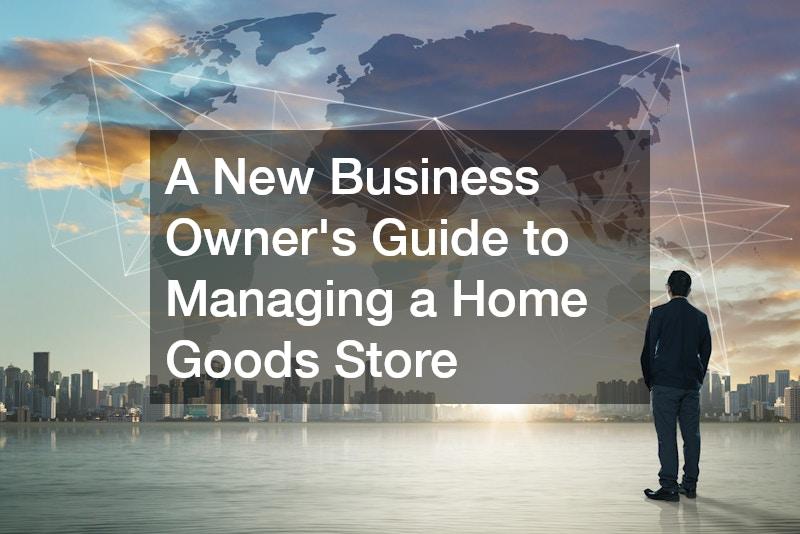Starting a home goods store is an exciting opportunity, but it also comes with numerous responsibilities. As a business owner, you’ll need to understand the market, manage inventory, interact with customers, and stay ahead of trends in home décor and furniture. From selling bedroom furniture to collaborating with contractors, managing a home goods store requires strategic planning, effective management, and a solid understanding of your target audience. In this guide, we’ll explore the essential aspects of running a successful home goods store, offering practical tips for new business owners.
Understanding Your Product Range

A successful home goods store offers a wide variety of products to meet the needs of diverse customers. From furniture to accessories, customers often look to these stores for everything they need to improve or furnish their homes. It’s crucial to curate a range of products that are both functional and stylish, keeping in mind the current trends and classic designs.
Bedroom Furniture Stores and Beyond
When managing a home goods store, you may choose to specialize in specific types of furniture, such as bedroom furniture. Offering a variety of options for beds, dressers, nightstands, and other bedroom essentials can make your store a destination for shoppers looking to update their homes. Bedroom furniture stores that offer both luxury and affordable options can cater to a wide range of customers. Keep an eye on trends in bedroom design, including minimalist styles, multi-functional furniture, and eco-friendly materials, to attract discerning buyers.
The Importance of a Mattress Selection

In addition to bedroom furniture, mattresses are a key category for home goods stores. Shoppers often look for the perfect combination of comfort and support, which means carrying a wide range of options is essential. Partnering with reputable mattress stores or suppliers will allow you to offer top brands and models, from memory foam to hybrid mattresses. Be sure to provide a range of price points and offer guidance to help customers choose the right mattress for their needs. A good mattress is a long-term investment, and offering warranties or return policies can make your store more appealing.
Offering a Range of Flooring Types
Flooring is another important product category for a home goods store. Homeowners and renters alike frequently upgrade or replace their floors, and offering a variety of options is essential to cater to different tastes and budgets. Stocking diverse flooring types such as hardwood, laminate, tile, and carpet allows your customers to find exactly what they need for their home improvement projects. Consider offering consultations and guidance on the pros and cons of each flooring type to help customers make informed decisions. Having samples and displays in-store can also make the shopping experience more engaging and informative.
Collaborating With Other Home Goods Services

Running a home goods store isn’t just about selling products. Successful store owners often collaborate with other local businesses and service providers to offer a complete home improvement experience. By building a network of reliable professionals, you can offer customers recommendations for complementary services that enhance their purchases.
Partnering With the Best Florists
A well-designed home isn’t complete without the right accents, and fresh flowers are an ideal finishing touch. By building partnerships with the best florists in your area, you can offer customers access to high-quality floral arrangements to complement their new furniture or home décor purchases. Florists can also provide seasonal or custom arrangements for special events, which can be a great way to enhance your store’s appeal. Consider offering a floral delivery service in conjunction with furniture purchases to add extra value for your customers.
Recommendations for Cleaning Solutions
Maintaining the quality of home goods is crucial for long-term customer satisfaction, especially when it comes to furniture, rugs, and flooring. Offering a selection of cleaning solutions specifically designed for different materials can be an excellent add-on to your product offerings. For instance, specialized cleaners for hardwood floors, upholstery, or leather furniture can help customers maintain their purchases for years to come. In addition, consider partnering with local cleaning service providers or offering in-store cleaning demonstrations to educate customers on how to care for their new items.
Building Relationships With Window Manufacturers
Windows are a vital element of any home, and they play a significant role in a room’s overall design. By developing strong relationships with window manufacturers , you can offer high-quality, durable windows as part of your home goods selection. You might also consider offering window treatments, such as blinds, curtains, or shades, to complement your product range. Additionally, if your store offers larger-scale home renovations, partnering with window manufacturers can lead to profitable collaborations, especially when working with contractors on full-scale projects.
Offering Professional Home Improvement Services
In addition to selling home goods, offering professional installation services can make your store a one-stop shop for customers looking to renovate or update their homes. By partnering with skilled tradespeople, you can ensure that your customers receive top-notch service when it comes to installing or repairing items they purchase from your store.
Door Installation Services
Customers often purchase new doors for aesthetic or functional reasons, and door installation is a service many homeowners require. Offering installation services for interior and exterior doors ensures that your customers won’t have to find a separate contractor for the job. Collaborating with local carpenters or installation experts allows you to provide professional services, which can enhance customer satisfaction and increase your store’s reputation as a comprehensive home improvement destination.
Collaborating With Local Rug Cleaners
If your store sells rugs or carpeting, partnering with a local rug cleaner can provide customers with a valuable service. Rugs can be an investment, and regular cleaning helps extend their lifespan and maintain their appearance. Offering cleaning services as part of a post-purchase care package or providing customers with a trusted recommendation can add value to your offerings. Many customers will appreciate the convenience of having their rug professionally cleaned without having to search for a service provider on their own.
Locksmiths and Security Services
Home security is a top concern for many homeowners, and offering products and services related to home security can attract a wider range of customers. Partnering with locksmiths to offer lock installation and repair services is a smart way to expand your offerings. Whether your customers need new locks for their doors, rekeying services, or high-tech smart locks, having a reliable locksmith on call ensures that your store is meeting their security needs. Consider offering a bundled package that includes door installation and lock services for homeowners undergoing major renovations.
Referring Painting Contractors
A fresh coat of paint can transform any room, and many customers who visit home goods stores are also planning to repaint their spaces. Referring reputable painting contractors to customers can enhance your service offerings and build strong community ties. Whether it’s a small accent wall or a full-scale exterior paint job, professional painting services can make a big difference in the final look of a home. Additionally, having a network of painting contractors allows you to collaborate on projects that involve furniture or décor updates, ensuring your customers get a cohesive and professional result.
Marketing and Promoting Your Home Goods Store

Once you’ve established a strong network of products and services, it’s essential to market your home goods store effectively. Attracting customers and building brand recognition requires a comprehensive marketing strategy that leverages both online and offline channels.
Building an Online Presence
In today’s digital age, having a strong online presence is crucial for any business. Start by building a user-friendly website that showcases your products and services, along with any partnerships you’ve developed with local service providers. Highlight your store’s specialties, such as bedroom furniture, mattresses, or flooring, and make it easy for customers to browse your inventory and contact you for more information. Consider adding an online shopping option to increase convenience for customers who prefer to shop from home.
Social media is another powerful tool for marketing your store. Regularly post updates about new arrivals, promotions, and collaborations with local businesses like florists, cleaners, and locksmiths. Engaging with your audience on platforms like Instagram, Facebook, and Pinterest can help you reach a broader audience and showcase the visual appeal of your products.
In-Store Events and Promotions
In addition to online marketing, hosting in-store events can be a great way to attract customers and build brand loyalty. Consider hosting a grand opening event, seasonal sales, or design workshops where customers can learn more about home décor trends and techniques. Offering exclusive discounts on popular items, such as mattresses or flooring, can draw in more foot traffic and encourage customers to make a purchase.
Partnering with local service providers, such as cleaning solution companies or locksmiths, for co-branded events can also strengthen your store’s position in the community. Customers will appreciate the convenience of accessing multiple home improvement services in one location, and these partnerships can lead to increased referrals and repeat business.
Managing Inventory and Suppliers
One of the most challenging aspects of running a home goods store is managing inventory. Ensuring that you have the right mix of products, without overstocking or running out of popular items, requires careful planning and strong relationships with suppliers.
Working With Reliable Suppliers
Your relationships with suppliers are key to keeping your store well-stocked and ensuring that you have high-quality products to offer your customers. Whether you’re working with bedroom furniture manufacturers, mattress suppliers, or window manufacturers, reliability and communication are essential. Build long-term relationships with suppliers who can provide consistent quality and timely deliveries. This will help you avoid stockouts or delays that can negatively affect customer satisfaction.
Monitoring Inventory Levels
Effective inventory management requires regular monitoring of stock levels and sales trends. Use inventory management software to track which products are selling well and which items are moving slowly. This data will help you make informed decisions about restocking and product selection. For seasonal items, such as outdoor furniture or seasonal décor, adjust your inventory based on demand to avoid overstocking at the end of the season.
The Importance of Finding Good Business Insurance
One of the most critical aspects of managing a home goods store that is often overlooked by new business owners is obtaining good business insurance. While managing inventory, marketing, and customer relationships are all essential components of running a successful store, protecting your business with the right insurance is equally important. Business insurance serves as a safety net, shielding your store from unforeseen risks that could otherwise lead to significant financial losses or even the closure of your business.
Protecting Against Property Damage
A home goods store typically holds a significant amount of inventory, from furniture and mattresses to flooring materials and home décor. With such valuable assets on the premises, it’s essential to protect your business from potential property damage caused by fire, water, theft, or vandalism. Comprehensive business insurance will cover the cost of repairing or replacing damaged inventory and property, ensuring that your store can recover quickly from unexpected incidents.
For example, if a flood damages your stock of mattresses or furniture, without insurance, you would be responsible for covering the cost of replacing those items out of pocket. With the right business insurance, those losses can be mitigated, allowing your business to bounce back faster.
Liability Coverage
Another key component of good business insurance is liability coverage. As a home goods store owner, you interact with customers daily, whether they are shopping in your store, visiting for a design consultation, or having products delivered to their homes. Accidents can happen, and if a customer is injured on your premises—such as slipping on a wet floor or tripping over an obstacle—your business could be held liable. Liability insurance will cover medical expenses, legal fees, and settlements, protecting your business from potentially devastating lawsuits.
Protecting Against Employee-Related Risks
If you have employees working in your store, workers’ compensation insurance is essential. It provides coverage for medical expenses and lost wages if an employee is injured on the job. In many states, workers’ compensation insurance is required by law, but even if it’s not mandatory in your location, it’s a wise investment to protect both your employees and your business.
Business Interruption Coverage
Unexpected events, such as a natural disaster or a major repair, can force your store to close temporarily. Business interruption insurance helps cover lost income and operating expenses during periods when your store cannot function as usual. This type of coverage ensures that you can continue to pay rent, utilities, and employee salaries while your business is recovering.
Managing a home goods store is a multifaceted endeavor that requires attention to detail, strong relationships with suppliers and service providers, and an effective marketing strategy. By offering a wide range of products, from furniture to flooring, and collaborating with local professionals like rug cleaners, locksmiths, and painting contractors, you can create a comprehensive shopping experience for your customers. Additionally, building a strong online presence and hosting in-store events can help you attract new customers and build brand loyalty. With careful planning and dedication, your home goods store can thrive and become a trusted resource for homeowners in your community.





